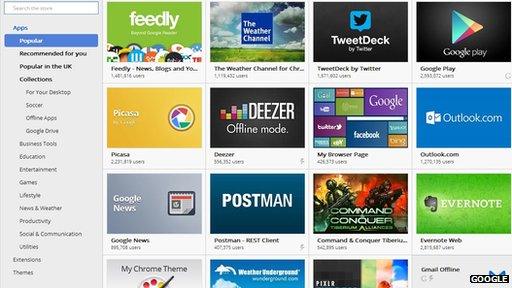Google tackles 'malicious' Chrome extensions
- Published

All Chrome extensions must now be loaded via the browser's web store
Google has imposed restrictions on where people can get extensions for its Chrome browser.
In a blogpost, external, the search giant said it was now going to allow only extensions hosted in its online store to be added to Chrome.
Before now it has been possible to add the extras via many different websites but Google said this is often how malicious extensions infect a browser.
The change means older extensions added outside the store will be disabled.
Extensions are a popular way for people to add extras to their browser that lets them, for instance, grab video clips, play games, use popular programs, send tweets or add utilities.
Google polices extensions hosted on its Chrome store but those available via other sites are often unchecked and can be the starting point for a malware campaign, it said.
"Malware can change how browsers work by silently installing extensions on your machine that do things like inject ads or track your browsing activity," wrote Erik Kay, engineering director, in a blogpost about the change.
Google's policy shift was first announced in November 2013 but Google delayed enforcing it to give developers and software firms a chance to get their extensions through its approval process and on the store.
- Published6 May 2014

- Published19 March 2014
- Published10 March 2014
